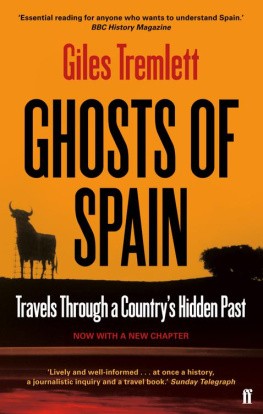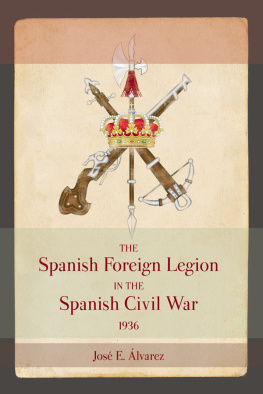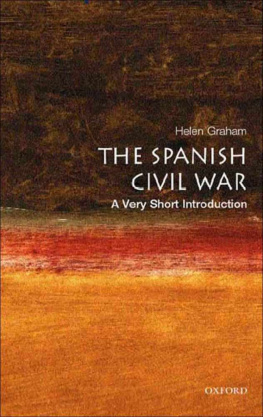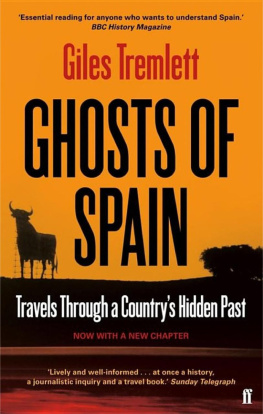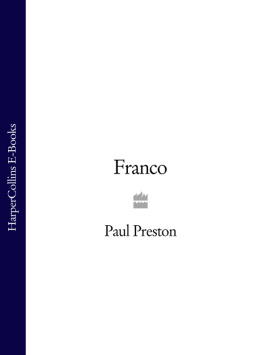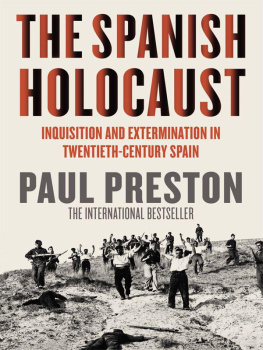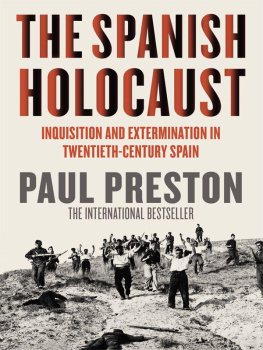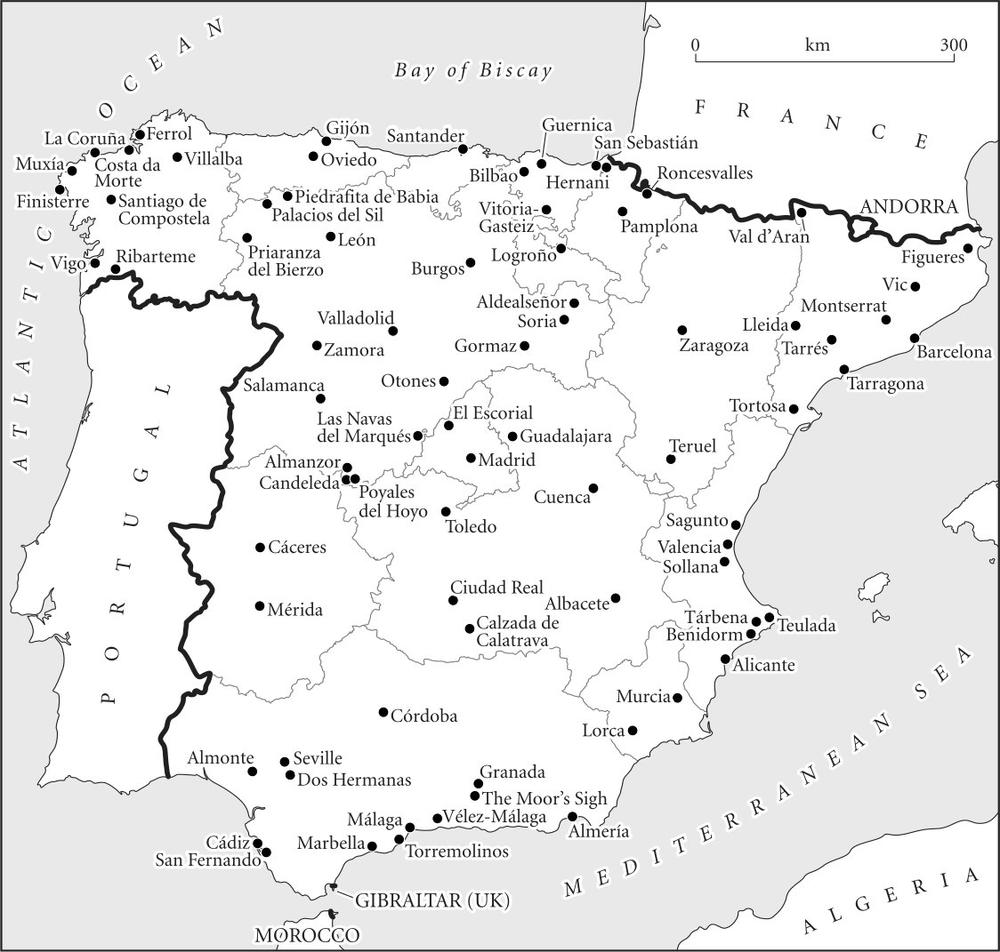Tremletts love of the country is as impressive as the range of his interviews and travels. Literary Review
Tremletts work will bring many who think we know Spain to confront what we have hesitated to acknowledge even to ourselves . Matthew Parris
A transfixing, elegantly written account of Spain today. Metro
An excellent and readable book for anyone interested in Spain. Scotland on Sunday
A feast of a book. Irish Times
Tremletts affectionate yet critical intimacy with the country helps to make this book much more than an ordinary journalistic survey [with the] sort of insight that vindicates his approach to a deeply traditional and fast-changing land. Wall Street Journal
An affectionate, deeply informed tour of the country. New York Times
A provocative and vividly written book that is part history, part political and social commentary, and part love letter. Library Journal
It is now early 2012 and a mixture of fear and vertigo has set in. Spain, once more, is moving quickly but no one quite knows where to or who, exactly, is making the decisions as the global economy goes through a powerful readjustment. In a globalised world, indeed, it is not just harder to discern what forces are at work in Spain. It also becomes harder to pick out the essential characteristics of a country that has become less hermetic and more varied in its own cultural and ethnic make-up since I first started working on this book.
Originally I had thought of trying to rewrite or, at least, update, each and every chapter, but I soon realised that was impossible. Ghosts of Spain describes a moment in Spanish history and in my personal experience of my adopted country and to rewrite it would mean starting again from scratch. But much has changed in the half-dozen years since the first edition was published and I am pleased to have the opportunity to bring readers up to date. It is a chance, amongst other things, to fill in some holes from the first edition and to add clarification or correct small, but annoying , mistakes where necessary. That means the original text has been retouched in just a few points, while an extra chapter carries the story up to today a time when Spains economy is, once more, in trouble and Spaniards as a whole are deeply anxious about their future.
The extra chapter replaces the epilogues written for the US edition and the UK paperback, updating a whole raft of themes from the early chapters, be they Spains ongoing battle with its own history , the battle against corruption or the death throes of Basque separatist terrorist group ETA. They also deal with issues that have much to say about Spains future and which, while hindsight tells me they were in front of my nose while I was writing the first edition, only the passage of time has allowed me to approach in a coherent and, I hope, meaningful fashion. The two main issues are the new Spaniards who poured into the country over the first decade of the twenty-first century a time when only the United States rivalled Spain as a destination for migrants to the developed world and the fall into dramatic economic decline and recession. Both issues are connected, and both have also required Spaniards to take a fresh look at themselves and ask what sort of a country they are now trying to construct.
There is now talk of a lost decade in which Spain will remain frozen, or even go backwards, while it tries to work through current problems. By the time this book is published, indeed, Spain may have been forced to drop the euro currency that has formed such an important part of its twenty-first-century identity. If not, it will certainly be in the middle of a titanic struggle to reduce its budget deficit and remain inside a euro zone dominated by Germany and France. The pessimism of ngel Ganivet, the man who spoke of Spain as a cage full of madmen, and others may soon reappear. This writer, however, continues to insist that a brighter future awaits. If there is one thing Spaniards have proven over the past four decades, it is their ability to ride change. The appearance of five million new Spaniards migrants who have arrived over the past decade with a keen desire to improve their lives works in favour of that, though only if Spaniards avoid the simplistic trap of racism. So, too, does the essential stability of Spains political system currently so dramatically different to those of other southern European countries like Italy, Portugal or Greece.
Madrid, 5 January 2012
In Spain the dead are more alive than the dead of any other place in the world: their profile wounds like the edge of a barbers razor.
Federico Garca Lorca
It is shortly before 7.00 a.m. on a cool Madrid spring morning. The traffic is still just a purr, though it will soon be a rumble and, some time after that, the usual riot of horns, ambulance sirens and roaring motorbike exhausts. This should be a small moment of peace in what must be one of Europes noisiest cities. A helicopter , however, has spent the past fifteen minutes poised noisily at roof-top level just a block down our street. The wide-open well of our six-storey apartment block is acting as a sound box that amplifies the relentless chugging and clattering. Sleep in our top-floor apartment seems, under these circumstances, impossible. I lie in bed worrying about whether the helicopter which does this every few weeks will wake the children. It is not as though they went to bed early, even though they have school today. One of them, a seven-year-old, got out of bed to take a phone call at 10 p.m. last night. It was another seven-year-old, excitedly inviting him to a birthday party at the weekend. Madrid boasts that it is a party town, a city that never sleeps. But does this really have to apply to the under eights?
I go out onto the balcony to wave a fist at the sleek white helicopter wondering why on earth it is hovering there, so low, so loud and so early. I expect all the other balconies to be filled up with angry people roused from their beds. I am, however, alone. I stand, solitary, deranged and dishevelled, amongst the wilting geraniums. Even at this stage of the year, they are gasping for water. It is one of those moments when I am reminded that, although I now consider this to be my city, I am really an extranjero , a foreigner. Noise, in Madrid, in Spain as a whole, is just background. It is part of the atmosphere, like air or daylight. I realise that I have been caught with my guard down. During the day, after I have showered and slipped my daily coat of Madridness on, I would not care about the mere roar of a helicopter. Noise and bustle are normally part of what I like about this city. At night, when I sleep, though, I am returned to my natural condition as what Spaniards like to call an anglosajn, an Anglo-Saxon . This description for native English speakers be they British, American, or from anywhere else has always amused me. It makes me think of runes and lyres, of Beowulf and the Venerable Bede.
This country is famous for noise. Newspapers occasionally report on how the noise levels of Madrid or Barcelona pose a danger to health and sanity. One in four Madrid streets subjects its residents to noise beyond World Health Organisation limits, one report tells me. Half of fourteen to twenty-seven-year-olds in Barcelona suffer irreversible hearing damage, another one warns. Little wonder, then, that even noise-numbed Spaniards are occasionally driven berserk. I recall a scene from a Barcelona square, late on a summers night, years ago. The square was packed with busy caf tables. Teenagers with noisy mopeds were driving around it in circles, their high-pitched exhausts screaming out over the hubbub of conversation and laughter. An angry, elderly woman appeared on a roof top and started shouting and waving her arms. Everyone ignored her. Then she began hurling empty Coke bottles down at us. The glass bottles exploded on the ground, shattering into tiny, flying fragments. We ran.

